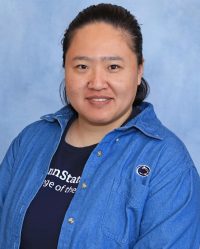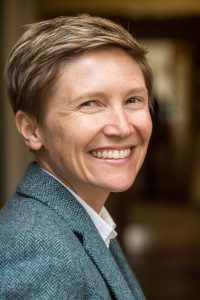People
Directorate

A scholar of comparative literature, modernism, and East Asia, Hayot is the author of four books, including Chinese Dreams (2004), The Hypothetical Mandarin (2009), On Literary Worlds (2012), and The Elements of Academic Style (2014); he is also a co-editor of Sinographies: Writing China (2007) and, most recently, of A New Vocabulary for Global Modernism (2016, with Rebecca Walkowitz). He has written about modernism, poetry, video games, the history of modernity, Asian American literature, and other topics. His current projects include a translation of Peter Janich’s Was ist Information? (with Lea Pao) and a monograph on the philosophy of literature.

Jonathan E. Abel is a scholar of Japanese media, film, and literature. As a professor of Comparative Literature and Japanese Studies at Penn State, Abel focuses his teaching and scholarly interests on questions of global modernism, literary reception, translation studies, film studies, new media, and literary and cultural theory. He has served as director of Penn State’s Global and International Studies Program and is currently associate director of its Center for Humanities and Information. For academic year 2022-2023, he was a Woodrow Wilson Center Fellow. He is co-translator of Karatani Kōjin’s Nation and Aesthetics: On Kant and Freud (Oxford University Press, 2017) and Azuma Hiroki’s Otaku: Japan’s Database Animals (University of Minnesota Press, 2008). He has edited several volumes, including a special issue of Japan Forum entitled “Beyond Fukushima: Culture, Media, and Meaning from Catastrophe” (2015), Information Keywords a book on humanistic approaches to the study of information (Columbia University Press, 2021), and a special issue of Verge: Studies in Global Asias on “Digital Asias” (University of Minnesota Press, Fall 2021). His first book, Redacted: The Archives of Censorship in Transwar Japan (University of California Press, 2012), examined how authors and censors (under the empire and during the occupation) worked to create a particular kind of literature, full of gaps and fissures, that remains popular in Japan today. His most recent book, The New Real: Media and Mimesis in Japan from Stereographs to Emoji (University of Minnesota Press, 2023), examines how the marketing and scholarly rhetoric around new media often overlap while contradicting the actual everyday encounter of users and their new media. He develops CineMAP Japan, a project that geotags and visualizes film locations to reveal how space matter and what places mean for cinema. He is currently working on a book length study, tentatively titled Subtitling the World: Fake News and Fictional Truth, which examines microfiction posted on Twitter and Instagram as test cases for policies about tagging fake news on social media.
Advisory Board
Jonathan Abel, Professor of Comparative Literature and Asian Studies
Richard Doyle, Liberal Arts Research Professor of English
Greg Eghigian, Associate Professor of History
Samuel Frederick, Assistant Professor of German
Matthew Jordan, Associate Professor of Film & Video Studies
Michele Kennerly, Assistant Professor of Communication Arts & Sciences
Daniel Purdy, Professor of German
Christopher Reed, Professor of English and Visual Culture
Mark Sentesy, Assistant Professor of Philosophy
Current Fellows
2024-2025 Predoctoral Fellows

Andrew Emerson is a dual-title Ph.D. candidate in the Departments of Comparative Literature and Asian Studies. His dissertation seeks to develop a media- and performance-based theory of allegory through readings of films, TV sitcoms, and theatrical productions from the contemporary Chinese-speaking world. His broader research interests include trauma studies, film and media, and East-West relations.

I am a Ph.D. student in the dual-title program of Comparative Literature and Women’s, Gender, and Sexuality Studies at Penn State. My research revolves around contemporary literature, queer theory and visual culture. I am interested in the question of how non-normative sexualities are portrayed, expressed and negotiated in Turkish, Arabic and Arab-Anglophone literatures.

I am a history graduate student in the early modern global field and have secondary fields in gender and Chinese history. My dissertation revolves around an 18th-century German language Jesuit periodical, Der Neue Welt-Bott, and its place in the rapidly changing early modern book world. In my dissertation, I discuss the strategic creation and marketing of the periodical, which aimed to draw in readers with a wide variety of interests, alongside evidence of actual reading to assess the periodical’s reach, use, and influence. I also compare the Welt-Bott to the more famous lettres édifiantes which it originally took inspiration from.

Jamie Henton is a sixth-year Ph.D. candidate in the History Department at Penn State, advised by Dr. Christina Snyder. Jamie's dissertation, “Assimilating the Masses: An Examination of Native American Education from the Indian New Deal through Termination, 1930-1970," explores how the Office of Indian Affairs pursued the education of Native American children after they promised to end assimilation efforts under new Commissioner of Indian Affairs John Collier. Paying close attention to federal Indian policy, education materials, and Native response, Jamie’s work highlights how assimilation efforts did not end under Commissioner Collier but thrived under new education programming. Jamie's is also currently co-authoring an article on the criminalization of whooping in Indian Territory. Her research interests include topics in Native American and African American environmental history, race relations between Black and Native peoples in the segregated South, and Native American education.

I am Ph.D. candidate in Latin American history and Women’s, Gender, and Sexuality Studies. My dissertation tells the stories of four plants—the vegetable ivory, the eucalyptus, the cundurango, and the toquilla straw palm—to depict Ecuador's scientific history from 1850 to 1925. Specifically, it examines how Ecuador's governments have promoted and engaged with British and U.S. scientific expeditions focused on bioprospecting, medical botany, and the creation of patents. This exploration sheds light on how these interactions influenced Ecuador's state formation and national scientific projects. Additionally, my research addresses the marginalization and exploitation of indigenous and local communities' knowledge(s)—particularly that of women, who possess deep expertise in local flora, fauna, and medicinal practices. By focusing on recovering how these women have historically utilized plants in horticulture and domestic medicine, my work highlights their significant yet often overlooked contributions to both science and society.

Minghui Sun is a Ph.D. candidate in Applied Linguistics at Penn State. Her research draws on linguistic anthropology, conversation analysis, and semiotic discourse analytic approaches to examine shared decision-making processes in small group meetings. With a specific focus on older adults, she investigates the ways in which they exercise agency, navigate relationships, and cultivate a sense of community through active participation and involvement in organizing events and activities, in the context of continuing care retirement communities. More broadly, she is also engaged with the methodologies of qualitative research and issues related to researcher’s positionality and ethics in conducting ethnographic studies.
2024-2025 Faculty Fellows

Jessamyn R. Abel is associate professor in the Asian Studies and History Departments and Affiliated Faculty of the School of International Affairs at Penn State. She is a historian of modern Japan with interests in democratization, technology, infrastructure, sports, and international relations. Her recently published book, Dream Super-Express: A Cultural History of the World’s First Bullet Train, views 1960s Japan through the window of the Tōkaidō Shinkansen, showing how infrastructure operates beyond its intended use as a means of transportation to perform cultural and sociological functions. Her first book, The International Minimum: Creativity and Contradiction in Japan’s Global Engagement, 1933-1964, examines the transwar development of Japanese internationalism. Her current research focuses on postwar Japan to examine the role of public institutions in shaping democracy by promoting democratic thought and practice.

Tony Frazier is a historian of modern Europe, with a specialty in the comparative history of slavery and emancipation in modern Britain. He has secondary interests in African American history and digital history. He conducts research in Black British history, material culture, Atlantic slavery, African American intellectual history and memory. Dr. Frazier has taught courses in Early Modern European History, Modern European History, British History, African American history, African Diaspora, United States, and World History. He currently serves on the Council of the American Historical Association (AHA).
He is currently writing his book manuscript tentatively titled Slaves Without Wages: Runaway Black Slaves and Servants in Eighteenth-Century London. This project investigates the meaning of freedom and liberty in English society, particularly as it relates to enslaved Black people, both before and after the 1772 Somerset Case. His research has been funded by the National Humanities Center.
After the completion of the book, he will continue to work on a digital history project that documents the origins of Emancipation Days and memory in African American communities after the Civil War.

Ekaterina Haskins is professor of Communication Arts and Sciences and Visual Studies at Penn State. Her research and teaching encompass rhetorical theory and history, public memory, and visual culture. She is the author of three monographs, including Popular Memories: Commemoration, Participatory Culture, and Democratic Citizenship (U of South Carolina Press, 2015) and Remembering the War, Forgetting the Terror: Appeals to Family Memory in Putin's Russia (Penn State Press, 2024). Her recent scholarship investigates the rhetoric and politics of public memory in Russia and post-Soviet countries. Haskins is a recipient of multiple awards, including the Distinguished Scholar Award from the Rhetorical and Communication Theory Division of the National Communication Association (2018) and the Everett Lee Hunt Award from the Eastern Communication Association (2005) for her book Logos and Power in Isocrates and Aristotle.

Anna Peterson is associate professor of Classics and Ancient Mediterranean Studies at Penn State. Her research focuses on imperial Greek literature, ancient epistolography, ancient comedy, and human-environment relations. Her first book, Laughter on the Fringes: The Reception of Old Comedy in the Imperial Greek World, examined the impact of Aristophanic comedy on imperial-era Greek literature, showing how later Greeks renegotiated and reinvented the aggressive and self-reflexive humor of Athenian Old Comedy. She is also the co-editor of the forthcoming volume, Greek Literary Topographies in the Roman Imperial World. Her current research project investigates the depictions of the city of Athens in imperial-era Greek literature.

Christina Snyder is the McCabe Greer Professor of History at Penn State. Snyder earned her A.B. in Anthropology from the University of Georgia and her Ph.D. in History from the University of North Carolina at Chapel Hill. Snyder is working on her third book, American Abolitions: The Slow Death and Many Afterlives of Slavery. Demonstrating that anti-slavery movements are as old as chattel slavery itself, this book examines efforts to abolish or prohibit slavery in North America from the 1500s to the 1800s.
Snyder is also the author of Great Crossings: Indians, Settlers, and Slaves in the Age of Jackson (Oxford, 2017) and Slavery in Indian Country: The Changing Face of Captivity in Early America (Harvard, 2010). These books received a wide range of accolades, including the Francis Parkman Prize, the John H. Dunning Prize, the James H. Broussard Prize, and the John C. Ewers Prize. Her research has been supported by the American Council of Learned Societies, the National Humanities Center, and the John Simon Guggenheim Memorial Foundation.

Michael J. Steudeman studies the rhetoric of education policy in the United States. His research considers how national education discourses reframe social problems, cultivate feelings of national belonging, and adjudicate exclusions from public life. In his book Absence of National Feeling: Education Debates in the Reconstruction Congress (University Press of Mississippi, forthcoming in 2025), Steudeman analyzes the central role that schools played in the idealistic visions and tragic compromises of Reconstruction Era legislators. In addition to studying educational rhetoric, Steudeman also writes about topics of neurodiversity, demagoguery, and presidential rhetoric. His research has been published in the Quarterly Journal of Speech, Rhetoric & Public Affairs, Rhetoric Society Quarterly, and History of Education Quarterly. He teaches courses on a range of topics, including Landmark Speeches, Argumentation, Rhetorics of Public Policy, and Rhetorical Criticism.
2024-2025 Visiting Fellows

Daniel Cunha is interested historical capitalism, critique of political economy, critical theory, and the Anthropocene. As a Ph.D. in Sociology, M.Sc. in Environmental Science and B.S. in Chemical Engineering, his research is trans-disciplinary, making use of concepts and methods from critical political economy, historical sociology, the world-systems perspective, and the natural sciences. His dissertation on the Industrial Revolution (ca. 1760-1840) conceptualizes it as world-historical, encompassing large-scale environmental and labor regime transformations and equally world-historical social resistance. He has articles published in Mediations, The Anthropocene Review, Critical Historical Studies, Journal of the World-Systems Research, among others, and is a coeditor of Sinal de Menos. His most recent publication, “Climate Science as Counterculture”, appeared in Liinc em Revista (2022). He is preparing a book on climate science which will show how it internalizes transformed subjectivities into its concepts, as part of world-historical developments spanning from the Second World War to May 68 and beyond.

Amrita De is a postdoctoral fellow in the Center of Humanities and Information at Penn State. Her research focuses on global south masculinity studies and affect theory. Her works have been published in NORMA, Boyhood Studies, Global Humanities and are forthcoming in other edited collections. She is also working her way through her first novel centered around contemporary Indian Masculinities.